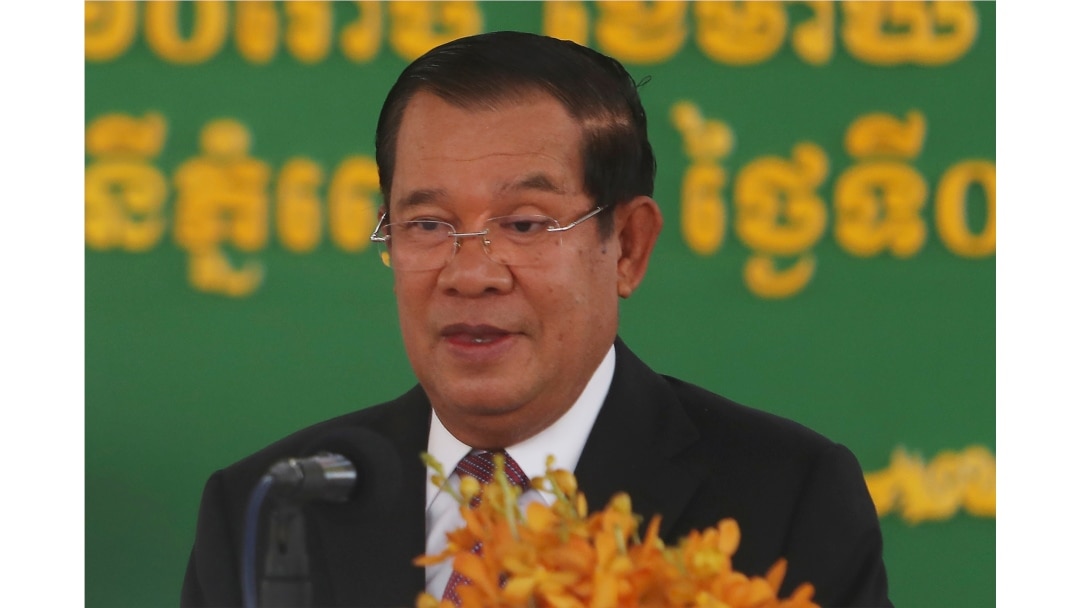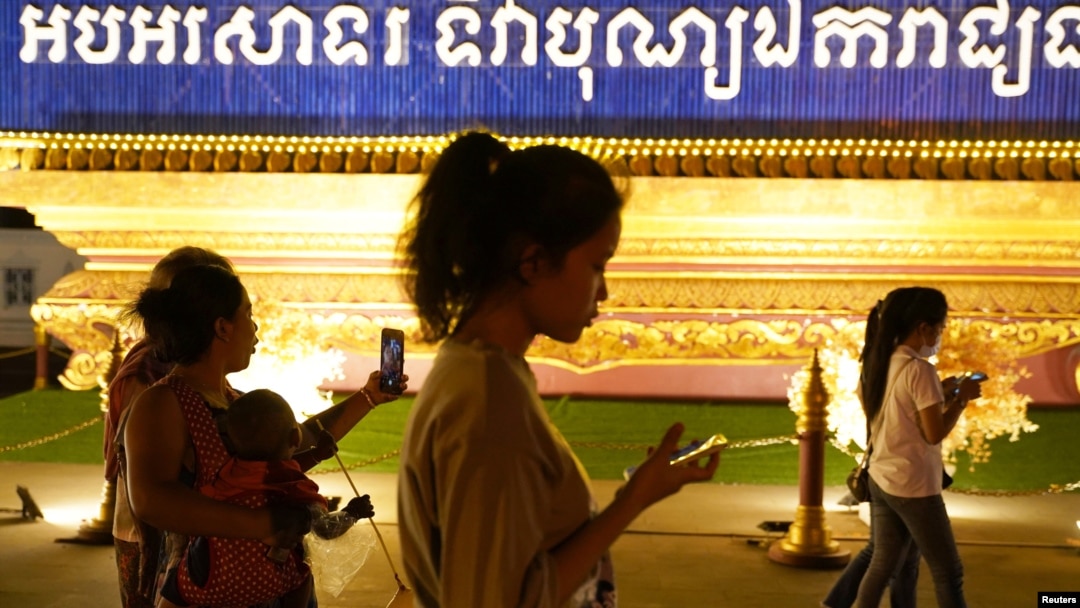Radio reporter Khut Sokun says he is doing less reporting this year. The reason: fear of Cambodia's national internet gateway, which he and others say allows the government to monitor all online activity.
Internet service providers in Cambodia have until February 2022 to redirect all their traffic through a regulatory body, or gateway, known as the NIG.
But since Prime Minister Hun Sen's government issued a regulation, known in Cambodia as a sub-decree, earlier this year, Sokun says he has adopted a "more cautious approach" to his reporting and comments posted online.
Sokun is not alone. Other journalists and rights groups who spoke with VOA say the regulation, which allows for punishment "in accordance with relevant laws," has increased the fear of arrest among media, critics and ordinary citizens.

FILE - Cambodian Prime Minister Hun Sen delivers a speech at Phnom Penh International Airport, in Phnom Penh, Cambodia, Feb. 7, 2021.
In a country with limited media freedom, the broad powers outlined in the NIG, including the power to monitor activity and block or disconnect the internet, are seen by many as another tool to suppress voices and increase fear.
Some have highlighted privacy concerns and the possibility of surveillance. Under the decree, operators must store data, share status reports and request that users verify their identities.
For Sokun, who reports for Voice of Democracy, one of Cambodia's few remaining independent broadcasters, the regulation has had a direct impact on how he works.
He has avoided reporting on protests and other events, saying, "The NIG did not help with my professional work; instead, it made it harder for me to report."
The journalist says his online activity and communications with sources risk being monitored and his reporting has angered authorities.
Local officials threaten him while he is working, Sokun said, and authorities have confiscated his equipment and taken his photo as he covers news events.
"I'm concerned about my personal safety and rather scared," Sokun told VOA in a phone interview. "If we express something (online), the government knows everything."
Suppression and eavesdropping
Cambodia has taken action against critical or independent reporting, including revoking the licenses of media organizations, arresting journalists for online reporting and ordering the blocking of content on news websites.
The government suppressed critical reporting in the run-up to the 2018 elections and during the coronavirus pandemic.
During the pandemic, Sovann Rithy, founder of the Facebook-based outlet TVFB, was charged with incitement after reporting on comments made by Prime Minister Hun Sen. Rithy was sentenced to 18 months in prison.
SEE ALSO: Cambodia's Sentencing of Journalist Over COVID-19 Comment a Threat to Freedoms, Media Groups SayThe prime minister himself recently entered a Zoom video call uninvited during a meeting of the opposition Cambodia National Rescue Party. Hun Sen said at a later event shared on Facebook that he had listened in on about 20 opposition calls without revealing himself, The Associated Press reported.
The incident has added to fears over internet privacy.
In an already controlled environment "the fear has risen," Robin Ramcharan, executive director of Asia Centre, told VOA in an interview about the internet gateway. "The capacity for internet control has increased dramatically, and it might be possible for the government, when it wishes, to simply turn off the switch."
"People are reluctant to speak openly and to express themselves now openly on the internet platforms, on the social media," Ramcharan said.
His Bangkok-based think tank found in August that critics and human rights defenders have "retreated into self-censorship and withdrawal from political engagement to ensure their survival."
Chhan Sokunthea, media development director of The Cambodian Center for Independent Media, parent organization of the Voice of Democracy, shared a similar view.
"Since the sub-decree on the NIG came out, social media users have been more fearful; they are more cautious when they use the internet," she told VOA.
Cybercrime protection
The Cambodian government has defended the need for the gateway, saying it will help manage cybercrime and make it easier to collect revenue.
"This is every government's obligation; which country does not control the internet or online (space)?" government spokesperson Phay Siphan asked VOA, adding that authorities have "no intention" of using the gateway to restrict rights or freedom.
But media and digital rights analysts are not convinced. Under the regulation, officials can limit, suspend, and revoke the licenses of internet operators and service providers and "prevent and cut off all connections affecting security, social order, morality, culture, tradition, and custom."
"The sub-decree allows government officials to surveil and monitor and even to shut down (the internet) when they see or suspect that the internet is being used in a way they deem inappropriate or affecting national security," said Nop Vy, executive director of Cambodian Journalists Alliance Association, an independent media organization based in Phnom Penh.
Ngeth Moses, a Phnom Penh-based freelance internet security consultant, said although part of the NIG was aimed at collecting national revenue lost to tax evasion, some clauses restricted people's rights and freedom, especially their online privacy.
"The government should ensure the application of the new regulation not cause fear to the internet and social media users so that journalists and the general public can get back to their active roles in performing their duties and free expression in political and social matters," he said.
Cambodia has around 8.8 million internet uses among its population of 16 million, according to Statista.
And surpassing the country's population are its 17 million mobile internet subscribers, according to statistics from the government's Telecommunication Regulator of Cambodia. The difference is attributed to some people owning more than one phone.
Despite wide internet use, rights groups, including Freedom House, have said that digital freedom in Cambodia remains under threat.
The country is listed as only partly free in the rights group's Freedom on the Net report, scoring 43 out of a possible 100. The group cited the internet gateway and other legislation that limits access to information online as reasons for the poor score.


